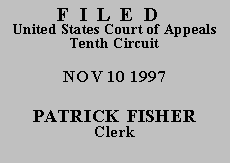

| UNITED STATES OF AMERICA, | |
| Plaintiff - Appellee, | |
| v. | |
| MANUEL ESCOBAR-VENZOR, | |
| Defendant - Appellant. |
Mr. Manuel Escobar-Venzor pled guilty to a charge of possession with intent to distribute more than 50 kilograms of marijuana in violation of 21 U.S.C. § 841(a)(1). He appeals his sentence, urging this court to find error in the district court's denial of downward adjustments pursuant to U.S. Sentencing Guidelines §§ 3B1.2 and 3E1.1(b).
Defendant argued to the district judge that he was "a man devoid of any similar criminal history, who is both naive and unsophisticated." R., Vol. I, Pleading 67 at 5. He argued this despite two prior drug-transporting arrests and his previous work as a confidential informant for law enforcement drug operations. Under these circumstances, the trial court did not commit clear error when it negated Defendant's claim that others were primarily involved and refused to grant him a U.S.S.G. § 3B1.2 minor participant adjustment. See United States v. Ballard, 16 F.3d 1110, 1115 (10th Cir. 1994) ("Appellant's assertion that she was a minor or minimal participant is not enough to overcome the clearly erroneous standard. The court could simply choose not to believe her."); United States v. Arredondo-Santos, 911 F.2d 424, 426 (10th Cir. 1990) (refusing to adopt a per se rule that allowed a downward adjustment for courier status, stating "[c]ouriers are indispensable to any drug-dealing network").
Defendant also contends that he was entitled to an additional downward adjustment point under U.S.S.G. § 3E1.1(b). His conduct does not qualify him for the additional one-level decrease under either of the two methods articulated in U.S.S.G. § 3E1.1(b). Section 3E1.1(b)(1) provides the adjustment for "timely providing complete information to the government concerning [Defendant's] own involvement in the offense." In this case, the government had to unearth Defendant's drug-trafficking history from its records and from his immigration file. R., Vol. III at 7-8. There is sufficient foundation for the court's determination that Defendant did not timely provide complete information, and such foundation prohibits our reversal under the clear error standard.
We also cannot see clear error in the trial court's refusal to grant the deduction pursuant to U.S.S.G. § 3E1.1(b)(2) for "timely notifying authorities of his intention to plead guilty, thereby permitting the government to avoid preparing for trial and permitting the court to allocate its resources efficiently." Defendant's trial was originally set for February 12, 1996, but Defendant filed and was granted nine motions to continue trial between January 18 and September 30 of 1996. Appellee's Brief at 1-2. In anticipation of trial, the government filed Requested Jury Instructions and Notice of Intent to Use Evidence of Other Crimes or Bad Acts pursuant to Federal Rule of Evidence 404(b). Id. at 7. On September 4, 1996, Defendant filed a Motion to Dismiss Indictment, which was denied on September 23, 1996. Id.; R., Vol. II, Pleading 47. Jury selection and trial were set for November 13, 1996, and on November 4 the government filed its proposed voir dire. Appellee's Brief at 7. Defendant did not enter a guilty plea until November 7, 1996. Appellant's Brief at 2. We cannot say the trial court was clearly
erroneous in determining Defendant did not qualify for the additional deduction under U.S.S.G. § 3E1.1(b)(2).
For the foregoing reasons, the trial court's judgment and sentence are AFFIRMED.
Entered for the Court
Monroe G. McKay
Circuit Judge
*. This order and judgment is not binding precedent, except under the doctrines of law of the case, res judicata, and collateral estoppel. The court generally disfavors the citation of orders and judgments; nevertheless, an order and judgment may be cited under the terms and conditions of 10th Cir. R. 36.3.